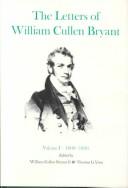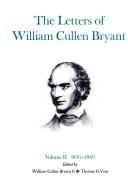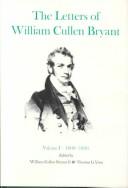| Listing 1 - 3 of 3 |
Sort by
|

ISBN: 0823287238 0823209911 Year: 1975 Publisher: New York : Fordham University Press,
Abstract | Keywords | Export | Availability | Bookmark
 Loading...
Loading...Choose an application
- Reference Manager
- EndNote
- RefWorks (Direct export to RefWorks)
This is the only collection ever made of Bryant's letters, two-thirds of which have never before been printed. Their publication was foreseen by the late Allan Nevin as "one of the most important and stimulating enterprises contributory to the enrichment of the nation's cultural and political life that is now within range of individual and group effort. William Cullen Bryant (1794–1878) was America's earliest national poet. His immediate followers—Longfellow, Poe, and Whitman—unquestionably began their distinguished careers in imitation of his verses. But Bryant was even more influential in his long career as a political journalist, and in his encouragement of American art, from his lectures at the National Academy of Design in 1828 to his evocation of the Metropolitan Museum of Art in 1870. Between the appearance of his first major poem, "Thanatopsis," in 1817, and his death sixty-one years later at the age of eight-three, Bryant knew and corresponded with an extraordinary number of eminent men and women. More than 2,100 of his know letters have already been recovered for the present edition. When William Cullen Bryant signed the first of 314 letters in the present volume, in 1809, he was a frail and shy farm boy of fourteen who had nonetheless already won some fame as the satirist of Thomas Jefferson. When he wrote the last, in 1836, he had become the chief poet of his country, the editor of its principal liberal newspaper, and the friend and collaborator of its leading artists and writers. His collected poems, previously published at New York, Boston, and London, were going into their third edition. His incisive editorials in the New York Evening Post were affecting the decisions of Andrew Jackson's administration. His poetic themes were beginning to find expression in the landscape paintings of Robert Weir, Asher Durand, and Thomas Cole. The early letters gathered here in chronological order give a unique picture of Cullen Bryant's youth and young manhood: his discipline in the classics preparatory to an all-too-brief college tenure; his legal study and subsequent law practice; the experiments with romantic versification which culminated in his poetic masterpieces, and those with the opposite sex which led to his courtship and marriage; his eager interest in the politics of the Madison and Monroe Presidencies, and his subsequent activities as a local politician and polemicist in western Massachusetts; his apprenticeship as magazine editor and literary critic in New York City, from which his later eminence as journalist was the natural evolution; the lectures on poetry and mythology which foreshadowed a long career as occasional orator; the collaboration in writing The Talisman, The American Landscape, and Tales of Glauber-Spa, and in forming the National Academy of Design, and the Sketch Club, which brought him intimacy with writers, artists, and publishers; his first trip to the American West, and his first long visit to Europe, during which he began the practice of writing letters to his newspaper which, throughout nearly half a century, proved him a perceptive interpreter of the distant scene to his contemporaries. Here, in essence, is the first volume of the autobiography of one whom Abraham Lincoln remarked after his first visit to New York City in 1860, "It was worth the journey to the East merely to see such a man." And John Bigelow, who of Bryant's many eulogists knew him best, said in 1878 of his longtime friend and business partner, "There was no eminent American upon whom the judgment of his countrymen would be more immediate and unanimous. The broad simple outline of his character and career had become universally familiar, like a mountain or a sea."
Poets, American --- Bryant, William Cullen, --- Bryant, W. C. --- Youth of thirteen, --- Asher Durand. --- Edgar Allan Poe. --- Henry Wadsworth Longfellow. --- Journalist. --- Letters. --- Massachusetts. --- National Academy of Design. --- New York City. --- New York Evening Post. --- Orator. --- Poetry. --- Political Journalism. --- Robert Weir. --- Satire. --- Tales of Glauber-Spa. --- Thanatopsis. --- The Talisman. --- Thomas Cole. --- Walt Whitman. --- William Cullen Bryant. --- Briefsammlung --- Poets, American. --- Bryant, William C. --- Correspondance. --- American poets

ISBN: 0823287254 0585165025 082320992X Year: 1975 Publisher: New York : Fordham University Press,
Abstract | Keywords | Export | Availability | Bookmark
 Loading...
Loading...Choose an application
- Reference Manager
- EndNote
- RefWorks (Direct export to RefWorks)
The second volume of William Cullen Bryant's letters opens in 1836 as he has just returned to New York from an extended visit to Europe to resume charge of the New York Evening Post, brought near to failure during his absence by his partner William Leggett's mismanagement. At the period's close, Bryant has found in John Bigelow an able editorial associate and astute partner, with whose help he has brought the paper close to its greatest financial prosperity and to national political and cultural influence.Bryant's letters lf the years between show the versatility of his concern with the crucial political, social, artistic, and literary movements of his time, and the varied friendships he enjoyed despite his preoccupation with a controversial daily paper, and with the sustenance of a poetic reputation yet unequaled among Americans. As president of the New York Homeopathic Society, in letters and editorials urging widespread public parks, and in his presidency of the New York Society for the Abolition of the Punishment of Death, he gave attention to public health, recreation, and order. He urged the rights of labor, foreign and religious minorities, and free African Americans; his most powerful political effort of the period was in opposition to the spread of slavery through the conquest of Mexico. An early commitment to free trade in material goods was maintained in letters and editorials, and to that in ideas by his presidency of the American Copyright Club and his support of the efforts of Charles Dickens and Harriet Martineau to secure from the United States Congress and international copyright agreement.Bryant's first visit to Great Britain came at the height of his poetic and journalistic fame in 1845, bringing him into cordial intimacy with members of Parliament, scientists, journalists, artists, and writers. In detailed letters to his wife, published here for the first time, he describes the pleasures he took in breakfasting with the literary patron Samuel Rogers and the American minister Edward Everett, boating on the Thames with artists and with diarist Henry Crabb Robinson, spending an evening in the home of Leigh Hunt, and calling on the Wordsworths at Rydal Mount as well as in the distinctions paid him at a rally of the Anti-Corn-Law League in Covent Garden Theatre, and at the annual meeting in Cambridge of the British Association for the Advancement of Science.Equally fresh are most of the letters to prominent Americans, many of them his close friends, such as the two Danas, Bancroft, Cole, Cooper, Dewey, Dix, Downing, Durand, Forrest, Greenough, Irving, Longfellow, Simms, Tilden, Van Buren, and Weir. His letters to the Evening Post recounting his observations and experiences during travels abroad and in the South, West, and Northeast of the United States, which were copied widely in other newspapers and praised highly by many of their subscribers, are here made available to the present-day reader.
American Copyright Club. --- Charles Dickens. --- Edward Everett. --- Harriet Martineau. --- Henry Crabb Robinson. --- Henry Wordsworth Longfellow. --- James Fenimore Cooper. --- John Bigelow. --- Leigh Hunt. --- Letters. --- New York Evening Post. --- New York Homeopathic Society. --- New York Society for the Abolition of the Punishment of Death. --- Samuel Rogers. --- Washington Irving. --- William Cullen Bryant. --- William Leggett. --- William Wordsworth. --- BIOGRAPHY & AUTOBIOGRAPHY / General. --- Briefsammlung --- Poets, American. --- Poets, American --- Bryant, William C. --- Bryant, William Cullen, --- Correspondance. --- American poets

ISBN: 0823287335 0823209962 Year: 2020 Publisher: Baltimore, Maryland : Project Muse,
Abstract | Keywords | Export | Availability | Bookmark
 Loading...
Loading...Choose an application
- Reference Manager
- EndNote
- RefWorks (Direct export to RefWorks)
On April 26, 1865, as Abraham Lincoln's funeral cortege paused in Union Square, New York, before being taken by rail to Springfield, Illinois, William Cullen Bryant listened as his own verse elegy for the slain president was read to a great concourse of mourners by the Reverend Samuel Osgood. Only five years earlier and a few blocks downtown, at Cooper Union, Bryant had introduced the prairie candidate to his first eastern audience. There his masterful appeal to the conscience of the nation prepared the way for his election to the presidency on the verge of the Civil War. Now, Bryant stood below Henry Kirke Brown's equestrian statue of George Washington, impressing Osgood as if he were "the 19tth Century itself thinking over the nation and the age in that presence." Bryant's staunch support of the Union cause throughout the war, and of Lincoln's war efforts, no less than his known influence with the president, led several prominent public figures to urge that he write Lincoln's biography. Oliver Wendell Holmes wrote him, "No man combines the qualities for his biographer so completely as yourself and the finished task would be a noble crown to a noble literary life." But Bryant declined, declaring his inability to record impartially critical events in which he had taken so central a part. Furthermore, while preoccupied with the editorial direction of the New York Evening Post, he was just then repossessing and enlarging his family's homestead at Cummington, Massachusetts, where he hoped his ailing wife might, during long summers in mountain air, regain her health. But in July 1866, Frances died of recurrent rheumatic fever, and, Bryant confessed to Richard Dana, he felt as "one cast out of Paradise." After France's death Bryant traveled with his daughter Julia for nearly a year through Great Britain and the Continent, where he met British statesman and novelist Edward Bulwer Lytton and French literary critic Hyppolyte Taine, renewed his friendship with Spanish poet Carolina Coronado, Italian liberator Giuseppe Garibaldi, and British and American artists, and visited the family of the young French journalist Georges Clemenceau, as well as the graves of earlier acquaintances Francis Lord Jeffrey and Elizabeth Barrett Browning. In his spare moments Bryant sought solace by beginning the translation of Homer, and Longfellow had found relief after his wife's tragic death by rendering into English Dante's Divine Comedy. Home again in New York, Bryant bought and settled in a house at 24 West 16th Street which would be his city home for the rest of his life. Here he completed major publications, including the Iliad and Odyssey of Homer and an exhaustive Library of Poetry and Song, and added to published tributes to earlier friends, such as Thomas Cole, Fenimore Cooper, and Washington Irving, memorial discourses on Fitz-Greene Halleck and Gulian Verplanck. In addition to his continued direction of the New York Homeopathic Medical college and the American Free Trade League, he was elected to the presidency of the Williams College Alumni Association, the International Copyright Association, and the Century Association, the club of artists and writers of which, twenty years earlier, he had been a principal founder and which he would direct for the last decade of his life.
American Library Association. --- Bryant Library. --- Central Park. --- Cummington, Massachusetts. --- Fitz-Greene Halleck. --- George Palmer Putnam. --- Giuseppe Mazzini. --- Horace Greeley. --- Journalism. --- Letters. --- Mexico City. --- New York City. --- New York Evening Post. --- New York Tribune. --- Orations and Addresses. --- Picturesque America. --- Poetry. --- President Benito Juarez. --- Presidential Library. --- Princeton University. --- Rutherford Hayes. --- Samuel Jones Tilden. --- Shakespeare. --- State Charities Aid Association. --- Walter Scott. --- William Cullen Bryant. --- BIOGRAPHY & AUTOBIOGRAPHY / General. --- Poets, American --- Bryant, William Cullen,
| Listing 1 - 3 of 3 |
Sort by
|

 Search
Search Feedback
Feedback About UniCat
About UniCat  Help
Help News
News